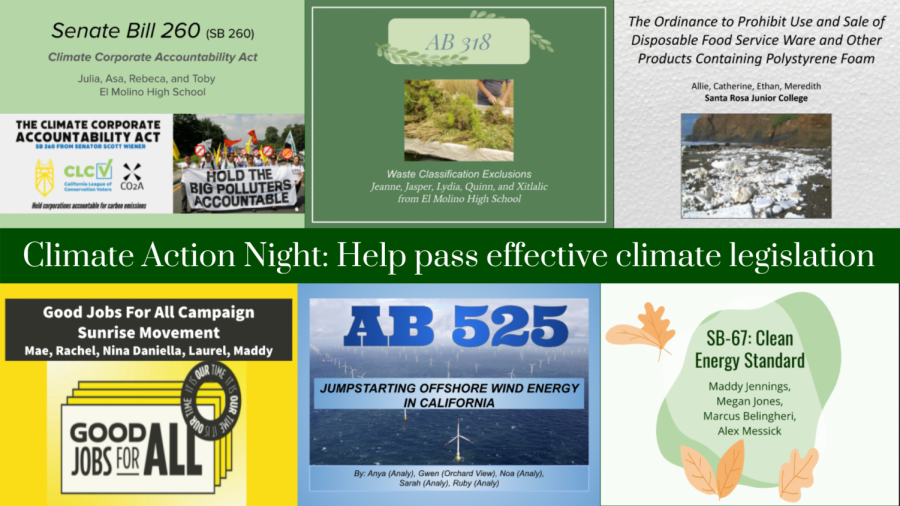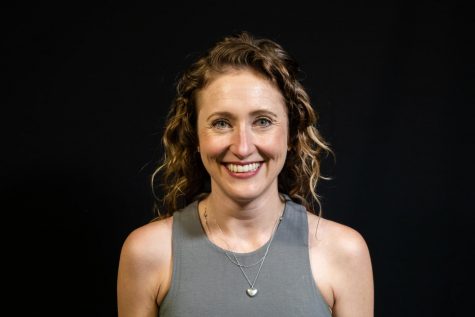Student presenters at Santa Rosa Junior College’s third annual Climate Action Night called on attendees to channel their climate-related anger and anxiety into action by pressuring state and local officials to encourage clean energy, ban fracking and all but eliminate single use plastics for takeout meals, among other topics.
Sponsored in part by SRJC’s Sustainability Committee and 350 Sonoma, a network of volunteer climate activists, the Thursday evening event drew a crowd of almost 200 to hear 12 presentations on as many ordinances and bills working their way through California’s legislative process, and to learn how to contact county and state lawmakers to influence their vote.
The student presenters represented not only SRJC, but a consortium of high schools and climate-centric grassroots community groups including the Sunrise Movement’s Sonoma Hub, Analy High School and a delegation from UCLA that will replicate Climate Action Night next year on their own campus.
Annette Lee, a second-year JC student with plans to study marine ecology and advocacy at Sonoma State University, presented on the Coalition Opposing New Gas Stations (CONGAS), an all-volunteer group that lobbies on both environmental and social justice grounds against new gas stations in Sonoma County. Since its formation two years ago, CONGAS defeated three proposed gas stations in the county.
“I think it’s really important to talk about environmental and climate crisis-related issues,” Lee, 18, said, “but I also believe it is even more important to act and do what you can to directly impact both local and larger initiatives.”
Like Lee and her classmates’ CONGAS discussion, the other presentations were succinct and focused. Topics included the Clean Energy Standard, which requires 100% of California’s electricity to come from clean energy by 2045; AB-1276, which prohibits restaurants and third-party delivery services from providing single-use utensils to customers unless they ask; and the Decarbonization Act of 2021, which requires all cities to decarbonize construction plans to achieve carbon neutrality by 2045.
Climate Action Night historically takes place at the end of April to coincide with California’s legislative season, or the time when constituents can have an outsize impact on whether bills become law.
“Right now, all these bills are in committee, and then by May and June [the committees] finalize, and then they get to this flurry of voting in July,” said Abigail Zoger, SRJC instructor and Climate Action Night co-chair, explaining why it’s so important for Sonoma County residents to make their voices heard now. An email or call to your state representative could affect whether an important climate bill makes it out of committee onto the floor for a vote in the fall.
“So right now is the time, really, that people’s voices really matter,” she said.
Zoger also stressed that action is needed at the state and local level because while Californians consider themselves the most eco-friendly Americans, state laws don’t always reflect our Northern Californian ethos.
“We think California has really got it all dialed-in, but the most important business here, SB-467 [a bill that would have banned oil and gas production in the state and required a buffer between drilling sites and schools,] — it got killed in committee. And we think, well, California’s got it all together, right? But that’s basic, like, ‘Don’t poison your public with your oil drilling,’” she said, lamenting that the bill failed before it even reached the floor.
Ani Fowler has been part of Climate Action Night since its first iteration, when she was in 11th grade. Now a natural sciences major in her first year at SRJC, Fowler provided perspective on how the event has changed since its inception.
“It has been so inspiring to see how many more young people have gotten involved but also how much support has grown for the event by members of the community and those at the legislative level,” she said. “The last two years out of the three that this event has existed has been online. Despite the challenges, the number of attendees has increased enormously, and that is a major sign of hope and empowerment to me.”
The empowerment message was clear, even from State Senator Mike McGuire, who taped a special message for the attendees.
“Those of us who have already been through these wildfires in the North Bay, we know that we can’t wait another second without taking action,” he said. “And because of you, we’re going to get it done. Because of your organizing, your mobilizing action. You’re giving the crisis the seriousness it deserves. And like I said, thank you. Thank you for leading the way. Together, we’re going to get it done. Let’s keep up the fight.”
That fight is also being at the highest levels of American government, where the Green New Deal is being argued over.
In an effort to help pass that legislation, the national Sunrise Movement launched its “Good Jobs for All” campaign to demand “senators and representatives do everything in their power to champion economic recovery legislation that invest $10 trillion in clean energy, transportation, housing, the care economy, public services and regenerative agriculture,” according to Madeline Reddell, 16, a student at Credo High School and member of Sunrise Sonoma County and Sunrise Sebastopol Youth.
At 16, Reddell cannot yet vote, a fact she calls “incredibly infuriating.”
“But just because I can’t have my voice heard in the electoral process doesn’t mean I can’t have my voice heard in other ways,” she said. “You vote with your money. There are a lot of big organizations that are destroying the environment, so being very intentional with the products you’re buying and the products you’re using, and your consumption, I think that’s really important.”
Fowler and Lee also understand the fight to mitigate the climate disaster needs to happen on both large and small scales. Fowler was a fellow with Youth vs Apocalypse and spoke at events including the Zero Waste North Bay Symposium and at a School Strike for Climate rally. On a personal level, Fowler’s family did away with its air conditioning system and opts to “simply open or close our windows when necessary.” She’s been using the same reusable water bottle for two years.
Lee is poised and ready to implement what she learned at Climate Action Night when she calls her elected representatives. She also stays away from single use plastics, and she avoids shopping fast fashion. Lee also believes in supporting local agriculture, and becoming vegetarian or vegan — when possible — for its environmental benefits. Her family composts at home.
For all three students, fixing the climate — reducing greenhouse gases, sequestering carbon in the earth, reducing waste that sits in landfills — is paramount to all other concerns.
“We live in Sonoma County, with our fires, and we’re seeing first-hand the effects of climate change,” Reddell said. “And it’s infuriating being a teenager in this world knowing that decisions that are being made now, not only by politicians but by voters, are going to affect me for the rest of my life. A lot of these politicians making these decisions are not going to have to live with this, but I am.”




